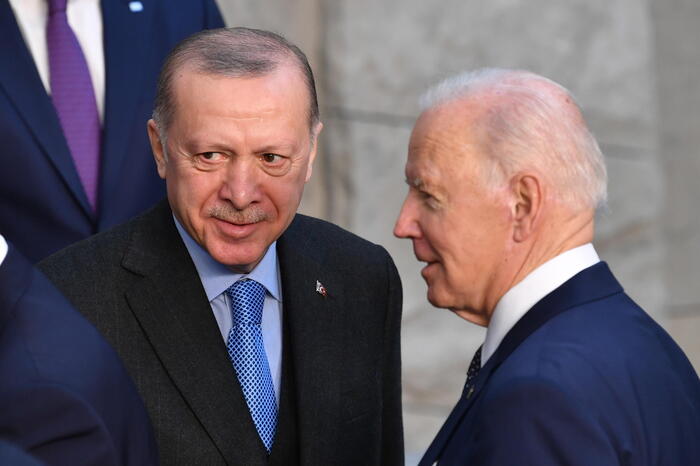Enlarge image
Waving again: US President Joe Biden before departure for Washington in Geneva
Photo: Patrick Semansky / AP
The president's message was clear: America is back and it wants to lead.
On his first trip to Europe as US head of state, Joe Biden made a series of powerful appearances last week: G7 summit in Cornwall, NATO and EU-USA summit in Brussels, followed by a conversation with Vladimir Putin in Geneva .
After the chaotic years under Donald Trump, when the USA rumbled over the world stage, Washington professionals are now at work again.
And they know what they want: contain China and Russia, militarily and economically.
Undoubtedly the Biden government has a strategy.
But does America still have the funds?
While Trump's troops saw the world as an arena in which nation states compete with one another for short-term advantages, Biden is now trying to unite the West again in order to remain capable of acting in the struggle with powerful geostrategic opponents. From this point of view, the results of the US President's trip to Europe are quite impressive. The US government has managed to get the G7 and NATO to position themselves against China. The European partners would actually like to be more lenient towards Beijing, because the economic dependency, especially Germany, is great. Shortly before the end of the year, the EU signed an extensive economic agreement with China.
Biden also enacted the G7 for his economic policy philosophy. "Build Back Better", the slogan above the gigantic program with which the US government wants to revive the economy and expand infrastructure and the welfare state, is now also above the G7 communiqué. In fact, the G7 summit commits the participating states to a kind of social democratic consensus. How this approach will be compatible with the German debt brake and the European fiscal pact, for example, will have to be seen in the coming years.
The Biden government's calculation is clear. It wants to impregnate the western countries against internal decay and attacks from outside. The massive expansion of state activity is intended to strengthen democracy, increase the satisfaction of the citizens and thus stop the slide into populism, polarization and illiberality. Everything belongs together: economy, prosperity, geopolitics. Military presence in Asia is part of it, where European warships are supposed to at least symbolically support the US Navy and impress China. In Africa, on the other hand, the gigantic development programs that have been announced are intended to curb Beijing's influence.
You don't have to find it all good.
But the US strategy is coherent - even if it is quite risky.
Biden's ambitious trip to Europe could mark a historic turning point, marking the resurgence of the West.
However, it could also prove to be an act of overconfidence that ultimately accelerates the decline of the West.
Conflicts are on hold
There are three big question marks hovering over the US return to its traditional leadership role: Is the US - and the West as a whole - still strong enough to enforce international rules?
Is the rest of the world ready to fund America's gigantic debt programs?
Is it that easy to undo the loss of confidence that the insane Trump presidency has left behind?
Let's start with the last question. Biden may act like a well-meaning internationalist. But it's only been six months since his predecessor incited a mob to storm the Capitol. The shocking images are still well remembered. And the Trump era is by no means over. The ex-president continues to exert great influence over the Republican Party, which appears to be radicalizing rather than reverting to its conservative roots.
Biden and the Democrats narrowly won the last election.
Torn and polarized as American society is, Trump himself or a figure of similar caliber could be elected again in three and a half years.
Trump would not be a one-time historical accident, but part of an unstable new normal.
Knowing about these imponderables is a heavy burden for Biden and his allies.
more on the subject
Airbus versus Boeing: EU and USA conclude “long armistice” in the aircraft conflict
During his visit to Europe, the US president tried to regain confidence.
Military support for the European NATO partners, which his predecessor repeatedly called into question, was the US's “sacred obligation”.
In general, he has tried to clear up conflicts.
Together with the EU, he put the transatlantic trade dispute over subsidies for Airbus and Boeing on hold and refrained from condemning the controversial Russia-Germany pipeline Nord Stream II.
And yet: The doubts remain as to whether America really wants to play a constructive global role in the long term.
Biden's gigantic financial bet
To pacify its own country, Biden's government has launched programs worth billions of dollars. The extent to which tax increases for the rich and for corporations can at least partially finance the expenditure depends on the approval of Congress. But that is uncertain. At this point in time, the "Build Back Better" slogan is a giant bet that the rest of the world will be willing to lend the US tons of money on extremely cheap terms. In the current year, predicts the International Monetary Fund (IMF), the US economy will have to pump 876 billion dollars abroad. So far, there has only been a current account deficit of this magnitude, namely in 2006. Shortly afterwards, the financial crisis broke out.
Whether the Biden government's bill will work is an open question.
It is possible that the dominance of the US dollar as a global reserve currency will be massively damaged - and thus America's ability to borrow in its own currency.
There is also the risk that inflation will solidify in the USA.
The result would be rising interest rates and a U-turn by the central bank, which would have to stop supporting government policy with large-scale bond purchases.
Consumer prices are already rising at an annual rate of five percent.
In the end, the financial markets could limit Biden's plans.
Rising inflation rates and the associated displeasure among the population could thwart the goal of internal pacification.
The west: left behind?
That leaves the third big question mark: the geopolitical strength of America and the West as a whole. Biden tries a restoration. America should appear again as a global power of order. It's just that the G7 - the USA, Japan, France, Great Britain, Italy, Canada and Germany - together have only a quarter of global economic output and world trade. As with other issues, little can be done in terms of climate protection without the two megacities of China and India. Together, the two billion-dollar nations emit 50 percent more climate-damaging gases than the USA and the EU. The US armed forces still have the largest arsenal in the world. But in this respect too, China is catching up quickly.
Regardless of which political field you look at: the West is comparatively weak - perhaps too weak to shape world politics and contain its opponents.
A hopeful look back
When the leading figures of the largest Western countries met for the first time at the world economic summit in Rambouillet near Paris, the global power structure looked very different.
Back then, in November 1975, they had no equal opponents on the world political stage.
The largest Western countries, which a little later called themselves G7, made up more than half of global economic output and world trade.
America's Atlantic and Pacific military alliances represented a tremendous superiority over all potential adversaries. Only when it came to nuclear missiles and European land forces were the Soviets on par.
China was bitterly poor, fixated on itself, and weakened and torn by the communist terror of the "cultural revolution".
Mao was sick and weak.
display
Henrik Muller
Short-circuit policy: How permanent indignation destroys our democracy
Publisher: Piper
Number of pages: 256
Publisher: Piper
Number of pages: 256
Buy for € 22.00
Price query time
20.06.2021 7.15 p.m.
No guarantee
Order from Amazon
Order from Thalia
Order from Weltbild
Product reviews are purely editorial and independent.
Via the so-called affiliate links above, we usually receive a commission from the dealer when making a purchase.
More information here
However, there are parallels to the present. Back then, too, the West was massively insecure. Confidence in the leading Western power, the USA, and indeed in the Western model, was severely damaged. Richard Nixon had recently resigned as US President after an impeachment procedure. In the Vietnam War, the world power USA had reached its limits. In the Middle East, the most important producing countries had formed the OPEC oil cartel and are now driving energy prices up and the western economies into stagnation and inflation. The dollar had lost its gold backing and its role as an international anchor currency. It didn't look good for America.
Things also seemed to get out of hand on this side of the Atlantic.
Continental Europe faced a wave of left-wing terror that sought to eradicate democracy and the market economy;
in Germany the RAF murdered, in Italy the Red Brigades murdered.
Great Britain was heading for the state's insolvency.
There was talk of ungovernability.
The West really did not give a good picture.
The spirit of Rambouillet, on the other hand, set an example: the leading western countries wanted to work together to ensure stability.
It was a signal - to its own people and to the great geostrategic opponent, the Soviet Union.
We are still there and we act together.
A decade and a half later, the Soviet Union had disintegrated.
The West and its values triumphed.
They shouldn't be copied.
Not today either.
The main economic events of the week ahead
Open assembly area
Berlin -
Heart of the German Economy
- German Industry Day (until Wednesday): The BDI is looking for the way towards climate neutrality.
With all kinds of political celebrities: Merkel, Altmaier, Spahn, Laschet, Scholz, Baerbock, Lindner, Söder.
Expand Tuesday area
Catania -
Who rules the world?
- Meeting of G20 ministers on labor, employment and training under the Italian Presidency.
The G20 summit will follow in July.
Mainz -
Suddenly Superstars
- General Meeting of Biontech.
Expand Wednesday area
Berlin -
Green Future?
- Start of the Digital German Farmers' Day 2021 (until Thursday).
Expand Thursday area
Brussels -
Europe, again
I
- EU summit (until Friday): The heads of state and government meet.
There is a lot to discuss: COVID-19, the economic recovery and the recovery plan, migration policy, relations with Turkey and Russia.
Munich -
German Economy
- Publication of the Ifo Business Climate Index.
Open area Friday
Brussels -
Europe, again II
- conclusion of the EU summit with press conferences and so on.









